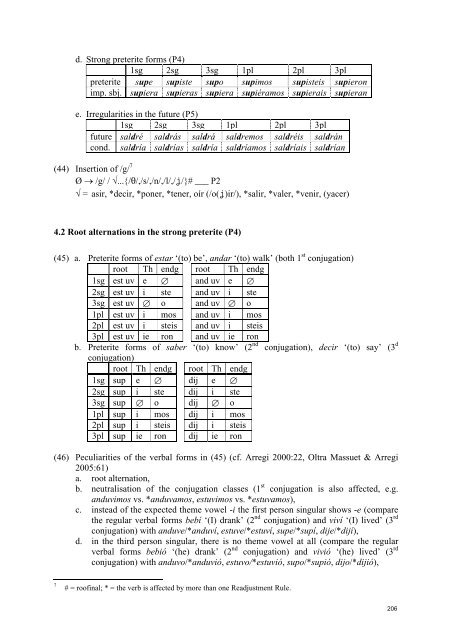morphological? - KOPS - Universität Konstanz
morphological? - KOPS - Universität Konstanz
morphological? - KOPS - Universität Konstanz
Create successful ePaper yourself
Turn your PDF publications into a flip-book with our unique Google optimized e-Paper software.
d. Strong preterite forms (P4)<br />
1sg 2sg 3sg 1pl 2pl 3pl<br />
preterite supe supiste supo supimos supisteis supieron<br />
imp. sbj. supiera supieras supiera supiéramos supierais supieran<br />
e. Irregularities in the future (P5)<br />
1sg 2sg 3sg 1pl 2pl 3pl<br />
future saldré saldrás saldrá saldremos saldréis saldrán<br />
cond. saldría saldrías saldría saldríamos saldríais saldrían<br />
(44) Insertion of /g/ 7<br />
Ø → /g/ / √...{//,/s/,/n/,/l/,//}# ___ P2<br />
√ = asir, *decir, *poner, *tener, oír (/o()ir/), *salir, *valer, *venir, (yacer)<br />
4.2 Root alternations in the strong preterite (P4)<br />
(45) a. Preterite forms of estar ‘(to) be’, andar ‘(to) walk’ (both 1 st conjugation)<br />
root Th endg root Th endg<br />
1sg est uv e ∅ and uv e ∅<br />
2sg est uv i ste and uv i ste<br />
3sg est uv ∅ o and uv ∅ o<br />
1pl est uv i mos and uv i mos<br />
2pl est uv i steis and uv i steis<br />
3pl est uv ie ron and uv ie ron<br />
b. Preterite forms of saber ‘(to) know’ (2 nd conjugation), decir ‘(to) say’ (3 d<br />
conjugation)<br />
root Th endg root Th endg<br />
1sg sup e ∅ dij e ∅<br />
2sg sup i ste dij i ste<br />
3sg sup ∅ o dij ∅ o<br />
1pl sup i mos dij i mos<br />
2pl sup i steis dij i steis<br />
3pl sup ie ron dij ie ron<br />
(46) Peculiarities of the verbal forms in (45) (cf. Arregi 2000:22, Oltra Massuet & Arregi<br />
2005:61)<br />
a. root alternation,<br />
b. neutralisation of the conjugation classes (1 st conjugation is also affected, e.g.<br />
anduvimos vs. *anduvamos, estuvimos vs. *estuvamos),<br />
c. instead of the expected theme vowel -i the first person singular shows -e (compare<br />
the regular verbal forms bebí ‘(I) drank’ (2 nd conjugation) and viví ‘(I) lived’ (3 rd<br />
conjugation) with anduve/*anduví, estuve/*estuví, supe/*supí, dije/*dijí),<br />
d. in the third person singular, there is no theme vowel at all (compare the regular<br />
verbal forms bebió ‘(he) drank’ (2 nd conjugation) and vivió ‘(he) lived’ (3 rd<br />
conjugation) with anduvo/*anduvió, estuvo/*estuvió, supo/*supió, dijo/*dijió),<br />
7 # = roofinal; * = the verb is affected by more than one Readjustment Rule.<br />
206

















